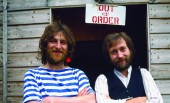There’s been numerous, endless articles about how streaming will be the future of music, new ways to market your acts, digital business, YouTube becoming a pay-walled service. Away from the glistening marketing and PR of start ups and big digital business, we got a bite of reality recently, as along with a wave of decent records and great shows, the live music scene in the UK got another round of death sentences.
Earlier in the year we ran a piece around redevelopment and the arts in South London and further afield. In the past month the Kazimier and club Nation in Liverpool have been put under threat, while the local council consider inner city redevelopment plans. Last week it was unveiled London’s new music supporting Buffalo Bar had been given its notice from its new landlords and its New Years Eve party will be its last. All the way back in July, Mayor of London Boris Johnson gave the go ahead for Earls Court to be demolished.
This is problematic for a number of reasons. The shrinking of a live music scene is detrimental to developing not only good musicians, but also a set of music fans which get out the house, and gives people an opportunity to interact with similar people for a night at a time. Most worryingly, these aren’t developments which have come from the venues failing, this is derailing venues and public spaces to give more land over to property developers. But who will want to live in towns which have no jobs in them, nothing to do, and no heritage left? The continued disregard and dismantling of independent shops, venues and public spaces, as Liverpool promoter Marc Jones says, “take the soul out of the city”.
I sat down with Marcus Harris, who we’ve had on this site quite a bit as a guest feature writer and editor over the past year, to talk live music and redevelopment. He’s been co-running White Heat (incidentally another club night currently looking for a new place of residence while its former home Madame Jojo’s undergoes some issues), and will also be noted as the one of the last bookers at the Buffalo Bar before it closes at the end of December.
Hi Marcus, just to start off, what got you into promotion, and how long ago?
I started my first night when Matty and Olly White Heat asked me to do a night at the Tatty Bogle, which was a basement in Kingley Court. I’d been DJing around the place, mainly playing post punk records, and used to run a zine called No More Heroes. Those were the sort of things that got you a night. It was a lot more “indie” back then. I’m not saying it was better or worse but I guess zines were the blogs of the past and record collections were harder to come by.
The first show I really remember putting on was, and I shit you not this was about my third ever show, it was Jack Penate opening for Late of the Pier! It would have been about February or March 2006 around the time I was dropping out of uni hard. I can’t remember who was in the middle but it might have been my good friends Blondelle or perhaps a guy who
faded into obscurity called Matthew Monroe.
How long have you lived in London for, and how has it changed in that time?
I was born in London so that’s twenty seven years. But my “night” life is about twelve, maybe thirteen years. I started off going to a lot of very bad gigs, everywhere seemed to do gigs, at least anywhere a 15 year old could get served. But seriously, most pubs seemed to do bands, you really don’t see that any more.
I think the biggest change in that time is how much central London isn’t a place to go out any more. You used to have three massive venues, the Cross Keys Warehouses (when I got into clubbing in my late teens), the End of course and scores of little basements, all sorts of obscure places, some of them feel like a disturbing dream you can’t quite remember. Now the whole place is one massive boring wine bar.
I think when you have a city like London that was left to decay for so long but still has this magnetic pull for artists those spaces naturally exist and are used by artists and musicians because they don’t have access to anything better. The really sad thing about London now is that it’s too slick, those spaces barely exist any more and what’s left is being hoovered up so fast by all this money that is flooding into the capital. There is barely anything left for the next generation to make their own and it worries me in the long term that our sort of people, people with a burning desire to make something, aren’t going to move here any more.
Central London does indeed seem to be ‘over’ in the going out sense. Even small corner pubs in town are chucking out pool tables and replacing them with £9 Pieminster pies. Post production houses are currently also being escorted out of their premises and are going to be turned into flats. Imagine how much a flat on Soho Square would cost! You’ve been working on the White Heat nights at Madame Jojo’s for a long time now, but the venue came under some trouble a couple of weeks ago… I’m presuming this is an incident involving the police so obviously not expecting too much detail, but based on experiences I witnessed in my home town (where the police would find any excuse to revoke a license), combined with this move towards turning everything residential, it does sound like there’s a lot of people out to kill the fun – what’s your experience of this? As soon as flats appear near a pub or a club it’s almost always downhill from there. Ministry of Sound almost got shut down, you’ve had places like The Griffin and Joiners Arms in East closing their door recently too…
The issue with Jojo’s, to be fair, wasn’t particularly the fun police reigning down their ‘smash Soho into boring little pieces’ thing that they’ve been doing, it was more of a serious failure on the venue’s part. At the same time there’s been a serious gang problem in that area (the Soho Stress Area) since the end of the Olympics when the police effectively gave up policing it and left it almost completely up to local security. Hopefully the venue will recover, but I do think that licensing are going to take this opportunity to punish them in some way which chimes with the general downhill spiral into mediocrity that the whole area is taking. I’m not particularly a supporter of the sex industry but if you look at Soho, the forced closure of sex shops, the clubs, bars and everything it really is a part of Westminster’s approach to Soho which is about making it a place for shopping, families and theatre with a midnight curfew.
From my personal experience running nights we’ve always had noise complaints from idiot residents who think it’s a great idea to move next door to a club that’s been there for twenty-whatever years. It’s a ridiculous situation where once you have a residential tenant their rights take priority over anything else. The other big problems that venues face when their leases come up for renewal is that the freeholders can make a lot more money turning the space into luxury apartments, apparently there’s a huge lack of luxury housing in London.
Just before we talk Buffalo, Liverpool is another UK city facing a bit of a crisis at the moment, with two venues (including the Kazimier, which I’ve even been to twice despite not living there) under threat from closure for town redevelopment. A promoter in the city called Marc Jones told The Echo: “We are returning to the dark days before the Capital Of Culture. The live music scene in Liverpool is dying on its feet. Every city has the same city centre now which has the same shops where no-one can find anything independent. But we want bands to be playing here, in smaller, grottier venues. We want to create a hub of independence. That is what made Liverpool famous. Plans like this take the soul out of the city”. So this definitely isn’t a London-only problem. Seems strange though that venues and clubs and pubs which attract an audience, keep people employed, and give people something to do and somewhere to go, can be so swiftly swept to the side by town and borough planning officials…
I really wouldn’t want to be the person who speculates as to why this sort of thing happens because it could sound a bit conspiracy theory! It’s two things in my eyes, people who have very little access to redress are easy targets, small business owners just scraping a living can’t fight the block of flats owned by an international construction group. But secondly and perhaps more insidiously, why is it that music and art, the two things synonymous with counter-cultural activity, are often the things that always tend to be the victims of disruption by local councils, planning and capital investment. Actually, you can extend that, especially in London, to low income housing. Is it coincidence or is it part of a wider attack on the right to demonstration and the gentrification of cities that we’re seeing in the UK? Marc Jones is right to want a “hub of independence”, we all do, but perhaps that’s exactly what is putting us in the firing line? In a way, the night time is and what happens within it is an act of defiance, I’ve always liked to think of cities in that way, as having a completely different meaning at night and it’s something that younger people can have access to, where they might not in the day.
Yeah it’s crazy isn’t it? To kick out a business which has been there for almost 15 years to have empty cellar space. I think everyone is still quite shocked.
One of the most amazing things about the Buffalo Bar is the sense of family in that place, everyone has been working and going there for so long that aside from being a venue it’s like a local social club. People pop in and out even if they’re not there for a gig. It’s a place that feels like it’s always been there and everyone assumed it would always be there. That’s what people will miss the most, definitely that’s the thing that’s really coming through across Facebook. There is a genuine sense of loss but that’s really indicative of the love that exists for it.
———–
In the conclusion to our look at these similar topics earlier in the year, it ended relatively positively, mainly because when places that people love are threatened with closure, they’re outwardly upset about it.
Unfortunately, all the noise won’t swing landlords into changing their minds, and inner city planning continues to feel unbelievably corrupt. There’s a whole generation currently leaving uni or starting work, watching infrastructure get knocked down, new property being far too expensive for them to do anything with, and being lost in a world where everyone’s increasingly told everything happens on the net. But who’d want to live in a place where nothing happens?
You can sign the petition to save the Buffalo bar HERE
Nicholas Burman






Follow us
Follow us on Facebook Follow us on Twitter Follow us on Google+ Subscribe our newsletter Add us to your feeds